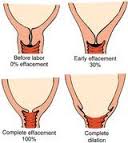Vaginal examinations in labour
are standard policy in most hospitals and are done either by a midwife or obstetrician.
For baby to be born, the cervix must change from closed to fully open (approx.. 10cms dilated). Vaginal examinations provide information on dilation, thinning of cervix and the position of baby’s head in the pelvis. Doctors and midwives are taught that this is a ‘normal’ part of ‘assessing a woman’s progress in labour’. It is unfortunate that this MEDICAL INTERVENTION is seen as mandatory and the ensuing decisions made, based on the results, which mostly have a negative impact on the birthing woman and her baby.

What happens to cervix in labour
Doctors and midwives are taught that vaginal examinations aim to reassure the woman (and staff) that the woman is labouring normally, and provide early warning if this is not the case!
There have been a number of studies showing that vaginal examinations in labour do not accurately assess ‘progress’ in labour, including a 2013 Cochrane review:
“We identified no convincing evidence to support, or reject, the use of routine vaginal examinations in labour, yet this is common practice throughout the world. It is surprising that there is such a widespread use of this intervention without good evidence of effectiveness.”
DISADVANTAGES OF VAGINAL EXAMINATIONS FOR WOMEN
- Most women say they are extremely uncomfortable to very painful
- Disempowering for women – they definitely erode a woman’s confidence in her innate ability to birth – without interference
- A serious medical intervention (especially for those who have requested NO interventions)
- Disempowering and emotionally uncomfortable for partners
- Baby definitely does not like having his head poked!
- Once 1 VE has been done, there will be repeat VE’s done usually every 3-4hrs. or sometimes more frequently
- A birthing woman is then ON THE CLOCK! Of course, the problem with going down this path, is that the staff then want to see ‘progress’ every 3-4hrs.
- If the dilation is the same after a repeat VE then the medical view is that there has been no progress so further and ‘other’ medical intervention is probably deemed necessary
- This one intervention can lead to the cascade of interventions. If the result of the VE is a negative one, women often find it difficult to stay true to their original plan of being strong and birthing without interference
The emotional cost for women should never be underestimated, especially those who have a past history of sexual abuse and domestic violence.
HOW TO AVOID VAGINAL EXAMINATIONS

Strong, quiet doula support
- GET A DOULA! This is my strongest recommendation. A doula is your advocate in labour, will keep you focused on what you want and provides silent accountability for staff. This means it is less likely for a ‘routine’ VE to be suggested!
2. You have a choice and should always give INFORMED CONSENT! ALWAYS!
3. Ask the midwife/doctor – what is the reason for a VE and how will this impact my labour?
4. There are many times that women request a VE in labour, even though their intentions were NOT to have any. This can be for a number of reasons: tiredness, feeling overwhelmed, sensing impatience from staff, curiosity, thinking about drug pain relief etc. An experienced doula has the skills to manoeuvre this situation, as she knows and respects the woman’s intentions.
5. Go sit on the toilet! A great place to be private in labour (or hide!) and just BE – you and baby. Nobody can get ‘at you’ on the toilet. The bath can also be a great place as it has a physical protective wall/barrier around you and baby.
6. It is always the woman’s choice. A woman can say NO (thanks) and change her mind later.
MEDICAL REASONS TO HAVE A VAGINAL EXAMINATION
- True foetal distress, i.e. baby’s heart rate is dipping and/or baby passing lots of poo (meconium). This is a rare event
- Very long labour
- Woman requesting
- Woman’s blood pressure rising/falling
- Woman’s temperature rising/falling
- Abnormal bleeding (other than the normal ‘show’)
All of the above are rare events.
The benefits of having a doula is to keep you focused on your innate womanly power and to trust and believe in your birthing body and baby. She will make sure your confidence does not wane throughout labour, birthing and decision making on behalf of your baby.
The most important organ involved in birthing is a woman’s MIND and her BELIEF system. A doula will keep that belief strong and at the forefront of every decision.
You can find out more about our training and Inside Birth prenatal classes here:




